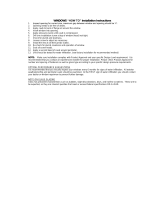
12
Outdoor Lifestyles by Hearth & Home Technologies • Carolina-B Installation Manual • 4066-500 Rev. E • 3/17
Figure 3.5 Clearances to Combustibles
Fireplace Structure
Noncombustible mat’l
Mantel
25 in.
(635 mm)
minimum
6 in.
(151 mm)
minimum - one side only.
Alcove installations require
14 in. (356 mm) from each side
of the firebox opening.
82 in.
(2083 mm)
minimum
height
Additional Structure
or Sidewall
Ceiling or
Overhang
12 in. (305 mm)
max. combustible
mantel depth
49-1/2 in.
(1257 mm)
minimum
16 in.
(406 mm)
deep non-combustible
hearth extension recommended
when floor in front is combustible.
WARNING! Risk of Fire! Com-
ply with all minimum clearances to
combustibles as specifi ed. Framing
or fi nishing material closer than the
minimums listed must be constructed
entirely of non-combustible materials
(i.e., steel studs, concrete board, etc).
C. Hearth Extension/Floor Protection
WARNING! Risk of Fire! Hearth extension recommended
to protect combustible fl oors in front of appliance.
D. Stand-Alone Installation
This appliance may be installed as a stand-alone unit.
• Construct a stand-alone surround of non-combustible
materials.
• Cement board or other Noncombustible material can
be applied directly to the metal and covered with Non-
combustible facing material.
• Air space clearances are not required for stand-alone
construction with non-combustible materials.
• Tape and seal all joints and corners.
• Provide proper fl ashing and moisture management
if installed on surfaces that may rot or otherwise be
damaged by water. (See also Section 4.B.)
When the stand-alone surround is constructed com-
pletely of noncombustible materials, stand-offs may be
removed to permit a smaller structure.
E. Built-in Installation
When this appliance is installed into a wall, we recom-
mend that the wall be an exterior wall system.
• See framing measurements in Figure 3.3 and 3.4.
• You must maintain 1 ½ in. (38mm) air space at the back
and sides (except the fi rst 6 inches from the front can
be zero to the framing). See Figures 3.3 and 3.4.
• The header must not be placed below the top of the
top standoffs.
• Noncombustible wall sheathing material is required
the fi rst 24 in. above the top of the fi rebox opening.
F. Moisture Resistance
This outdoor appliance will shed moderate amounts of
water, but is not waterproof. This appliance must be en-
closed or covered with noncombustible fi nish material
and all joints sealed to prevent water infi ltration.
The fi rebox will not perform as an exterior wall. Moisture
penetration must be considered for construction that
places the appliance in structure walls or on moisture
sensitive surfaces.
When installed on exterior walls: Hearth & Home Tech-
nologies recommends that the chase be constructed out-
side the structure’s weather envelope. Where the plat-
form meets the wall, use a fl ashing detail similar to that
required for attached decks. Chase platforms, including
hearths should slope away from the structure at 1/8 in.
to 1/4 in. per foot. The appliance can be shimmed level.
• A 24 inch tall cement board has been provided for
this installation and has been fastened to the back of
the appliance for shipping purposes.
• Put a bead of caulking across the top of the fi rebox
fl ange before installing 24 inch tall cement board.
• The control box MUST be relocated to be easily
accessible. See Section 5.C.
• Flash the perimeter of the appliance, corners and the
appliance face in a manner consistent with regional
practices as required to prevent water penetration
around the appliance or manage water that may
penetrate the appliance. See Section 3.D. and Figure
3.1 (CARODG36I-B) and 3.2 (CARODG42I-B) for more
information regarding wall and enclosure construction.
Note: Clearance to a window or door that
may be opened = 12 inches






















